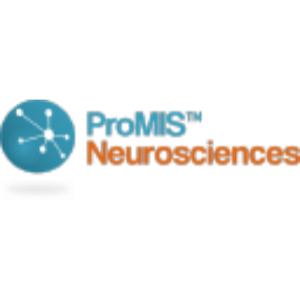ProMIS Neurosciences Announces First Quarter 2025 Financial Results
Rhea-AI Summary
Positive
- Completed first cohort enrollment in PRECISE-AD trial for PMN310, with rapid enrollment exceeding expectations
- PMN310 shows potential for improved safety profile by avoiding ARIA, a major concern with current Alzheimer's treatments
- Strong trial design with 95% confidence for ARIA detection and sufficient power for biomarker and clinical outcomes
- Advancing multiple pipeline candidates including ALS (PMN267) and synucleinopathies vaccine (PMN440) programs
Negative
- Cash position decreased from $13.3M to $8.4M in Q1 2025
- Net loss increased significantly to $7.3M from $3.6M year-over-year
- R&D expenses more than doubled to $5.5M from $2.1M year-over-year
- Final trial results not expected until end of 2026
News Market Reaction
On the day this news was published, PMN declined 0.20%, reflecting a mild negative market reaction.
Data tracked by StockTitan Argus on the day of publication.
First Cohort Completed in PRECISE-AD Trial Evaluating PMN310 in Alzheimer’s Disease
Six Month Interim Results Expected in 1H 2026
Topline Results Anticipated by end of 2026
CAMBRIDGE, Massachusetts, May 12, 2025 (GLOBE NEWSWIRE) -- ProMIS Neurosciences Inc. (Nasdaq: PMN), a clinical-stage biotechnology company focused on the generation and development of antibody therapeutics targeting toxic misfolded proteins in neurodegenerative diseases, such as Alzheimer’s disease (AD), amyotrophic lateral sclerosis (ALS), Parkinson’s disease (PD) and multiple system atrophy (MSA), today announced financial results for the first quarter ended March 31, 2025.
“We made significant progress in the first quarter of 2025, advancing our lead clinical program in Alzheimer’s disease with rapid enrollment of the first cohort in the PRECISE-AD trial,” said Neil Warma, Chief Executive Officer of ProMIS Neurosciences. “The pace of enrollment exceeded our expectations, reflecting the growing enthusiasm from investigators for PMN310’s differentiated profile. Based on its selective targeting of toxic Aβ oligomers and the potential to avoid ARIA—a serious safety concern seen with existing therapies—we believe PMN310 could set a new standard as a best-in-class treatment for Alzheimer’s treatment. Delivering a therapy that combines strong efficacy with a substantially improved safety profile would be a transformative milestone for patients and caregivers.”
“While PRECISE-AD is designed as a 12-month, double-blind study, it is powered to detect biomarker changes as early as six months,” Mr. Warma continued. “We view the planned interim analysis in the first half of 2026 as an important opportunity to generate early insights into PMN310’s potential to drive both clinical benefit and improved tolerability, particularly with respect to reducing or avoiding ARIA, a key differentiator in this space. Coupled with our directed targeting of toxic oligomers, we believe the benefit:risk profile will surpass current marketed therapies”
Recent Highlights
Alzheimer’s Disease Program (PMN310)
ProMIS’ lead candidate, PMN310, is a humanized IgG1 antibody directed toward toxic amyloid-beta oligomers (AβO) that are believed to be a major driver of AD.
- Announced in early January 2025, ProMIS initiated PRECISE-AD based on the encouraging results from the Phase 1a trial of PMN310 and has since completed enrollment of the first cohort of patients and successfully dosed multiple patients with PMN310 in the Phase 1b trial.
- PRECISE-AD (NCT06750432) is a randomized, double-blind, placebo-controlled study to evaluate the safety, tolerability and pharmacokinetics (PK) of multiple ascending doses (5, 10, 20 mg/kg) of intravenous PMN310 in patients with Mild Cognitive Impairment due to Alzheimer’s disease and mild Alzheimer’s disease (Stage 3 and Stage 4 AD). The study plans to enroll approximately 128 patients across 22 active sites in the United States. Eligible patients will be dosed monthly at one of the three dose levels or placebo over 12 months with assessment of safety, tolerability, PK, and pharmacodynamic blood-based markers of treatment effect at baseline and every three months and cerebrospinal fluid biomarkers at baseline and every 6 months. Frequent MRI scans, especially early in treatment, and throughout the study will be conducted to monitor for any emergence of ARIA. Cognitive clinical outcomes will also be assessed at baseline, 6 months and 12 months.
- Safety will be a primary outcome of the study with particular emphasis on assessing the expectation that, as a non-plaque binder, PMN310 will have a reduced risk of ARIA. The study is powered to provide
95% confidence for detection of ARIA.
- The study has been designed with a sample size intended to provide sufficient power to provide meaningful insight into effects of PMN310 on biomarkers and clinical outcomes.
- PRECISE-AD will be the first study to examine the effects of a monoclonal antibody directed solely against AβO on biomarkers associated with AD pathology and clinical outcomes.
- ProMIS expects to report six-month interim results from PRECISE-AD in the first half of 2026, with topline results anticipated by the end of 2026. We anticipate the six-month interim analysis will include impact of biomarkers and safety (including incidence of ARIA), with final analysis to include clinical outcome measures.
ProMIS continues to advance its Aβ vaccine program in AD based on its oligomer target epitope(s) – PMN311.
- In April 2025, ProMIS presented preclinical data at the American Alzheimer’s and Parkinson’s Disease International Conference (AD/PD Conference) and the Academy of Neurology Annual Meeting (AAN Annual Meeting). Key highlights from the presentation titled, “Novel approach to optimization of Alzheimer’s vaccine configuration for maximal targeting of toxic amyloid-beta oligomers” include:
- A large body of evidence indicates that soluble toxic AβO are a primary driver of AD.
- Through computational modeling, four different conformational B cell epitopes of AβOs were identified. A novel approach was utilized to select an optimal vaccine composition amongst 15 possible combinations of one to four epitopes to provide maximal binding to a toxic oligomer-enriched low molecular weight fraction of soluble AD brain extract.
- Results from the preclinical study showed that immunization with a single conformational epitope, peptide 301, the target of PMN310 antibody, was sufficient to produce maximal reactivity against AD brain oligomers.
Amyotrophic Lateral Sclerosis Disease Program (PMN267)
PMN267 is a humanized IgG1 antibody directed against toxic misfolded TDP-43 as a potential therapeutic target for ALS.
- ProMIS presented a virtual oral presentation of preclinical data at the AD/PD Conference. Key highlights from the presentation titled, “Selective targeting of pathogenic TDP-43 with misfolding-specific monoclonal antibodies and intrabodies against a pathogenic loss-of-structure epitope in the N-terminal domain” include:
- Proof-of-concept evidence that supports selective targeting of misfolded toxic aggregates of TDP-43 by monoclonal antibodies (mAbs) such as PMN267 as a potentially safe and effective avenue to treat ALS and other TDP-43 proteinopathies.
- TDP-43 mAbs
- Display high affinity against the misfolded TDP-43 epitope
- Selectively react with pathological TDP-43 and not normal TDP-43
- Inhibit cell-to-cell transmission of misfolded TDP-43
- TDP-43 mAbs and corresponding intrabodies specifically react with cytoplasmic aggregates of misfolded TDP-43
- Intrabodies accelerate the degradation of misfolded TDP-43
- Intrabody reduces TDP-43 aggregates in iPSC-derived ALS motor neurons under chronic stress conditions
- TDP-43 mAbs
- Proof-of-concept evidence that supports selective targeting of misfolded toxic aggregates of TDP-43 by monoclonal antibodies (mAbs) such as PMN267 as a potentially safe and effective avenue to treat ALS and other TDP-43 proteinopathies.
Multiple Synucleinopathies Disease Vaccine Program (PMN440)
- In April 2025, ProMIS presented preclinical data at the AD/PD Conference and at the AAN Annual Meeting. Key highlights from the presentation titled, “Novel approach to optimization of alpha-synuclein vaccine composition for maximal targeting of toxic alpha-synuclein species” and “Rational design of a vaccine for synucleinopathies using computationally-derived conformational B cell epitopes to selectively target pathogenic alpha-synuclein species” include:
- Vaccination against pathogenic species of alpha-synuclein (ASyn); (toxic oligomers, small soluble seeding fibrils), has the potential to protect against synucleinopathies, which include PD, dementia with Lewy bodies and MSA.
- Vaccine constructs containing computationally-derived conformational B cell epitopes of misfolded pathogenic ASyn were tested in mice. The potential advantage of this approach, as opposed to inducing pan-ASyn reactivity, lies in preserving normal ASyn function and minimizing the diversion of active antibody by the more abundant non-toxic forms of the protein in the blood and central nervous system.
- Results from the preclinical study showed that vaccination with conformational B cell epitopes produced high affinity antibodies with the desired selectivity for pathogenic ASyn and identified optimal vaccine configurations for further development.
- These data sets showcase the potential of vaccinations with conformational B cell epitopes to produce high affinity antibodies with the desired selectivity for pathogenic Asyn and supports the development of PMN440 vaccine as a treatment for synucleinopathies, such as PD, dementia with Lewy bodies and MSA.
First Quarter 2025 Financial Highlights
- Cash and cash equivalents were
$8.4 million as of March 31, 2025, compared to$13.3 million as of December 31, 2024.
- Research and development expenses were
$5.5 million for the first quarter ended March 31, 2025, compared to$2.1 million for the same period in 2024. The increase was primarily attributable to costs related to the execution of the PMN310 Phase 1b clinical trial.
- General and administrative expenses increased to
$2.0 million for the first quarter ended March 31, 2025, compared to$1.6 million for the same period in 2024.
- Net loss was
$7.3 million for the first quarter ended March 31, 2025, compared to a net loss of$3.6 million for the same period in 2024. The net loss was primarily attributable to the increase in clinical trial expenses.
About ProMIS Neurosciences Inc.
ProMIS Neurosciences Inc. is a clinical stage biotechnology company focused on generating and developing antibody therapeutics selectively targeting toxic misfolded proteins in neurodegenerative diseases such as Alzheimer’s disease (AD), amyotrophic lateral sclerosis (ALS) and multiple system atrophy (MSA). The Company’s proprietary target discovery engine applies a thermodynamic, computational discovery platform to predict novel targets known as Disease Specific Epitopes on the molecular surface of misfolded proteins. PMN310, the Company’s lead product candidate for the treatment of AD, is a differentiated, humanized monoclonal antibody that has been designed to specifically bind toxic Aβ oligomers and to not bind plaque or monomers. Oligomers are known to drive disease progression in AD and PMN310 appears to selectively bind oligomers. PMN310 has successfully completed a Phase 1a clinical study and is dosing AD patients in its Phase 1b clinical trial. ProMIS has offices in Cambridge, Massachusetts and Toronto, Ontario.
Forward-looking Statements
Nasdaq has not reviewed and does not accept responsibility for the adequacy or accuracy of this release. Certain information in this news release constitutes forward-looking statements and forward-looking information (collectively, “forward-looking information”) within the meaning of applicable securities laws. In some cases, but not necessarily in all cases, forward-looking information can be identified by the use of forward-looking terminology such as “plans”, “targets”, “expects” or “does not expect”, “is expected”, “excited about”, “an opportunity exists”, “is positioned”, “estimates”, “intends”, “assumes”, “anticipates” or “does not anticipate” or “believes”, or variations of such words and phrases or state that certain actions, events or results “may”, “could”, “would”, “might”, “will” or “will be taken”, “occur” or “be achieved”. In addition, any statements that refer to expectations, projections or other characterizations of future events or circumstances contain forward-looking information. Specifically, this news release contains forward-looking information relating to the Company’s Phase 1b study in AD patients and expectations of such study results, including first cohort completion in the second quarter of 2025,interim results in the first half of 2026 and topline results by the end of 2026, statements relating to the Company's progress, including enrollment and dosing for its Phase 1b clinical trial, the potential for such studies to provide the first proof-of-concept data for PMN310, the potential that PMN310 has the potential to positively benefit patients with AD, the targeting of toxic misfolded proteins in neurodegenerative diseases that the Company believes may directly address fundamental AD pathology (including the belief and understanding that toxic oligomers of Aβ are a major driver of AD) and have greater therapeutic potential due to reduction of off-target activity, a computationally-derived Aβ vaccine for AD and the Company’s PMN310 antibody and vaccine candidate, management’s belief that its patented platform technology has created an antibody candidate specific to toxic misfolded oligomers known to be present in AD, therapeutic activity and preferential targeting of toxic soluble aggregates by Aß-directed antibodies and the potential implications thereof, the Company’s pipeline, including application of its platform to other diseases, statements regarding preclinical data, recent presentations of such preclinical data and the takeaways therefrom, the ability to continue its growth and realize the anticipated contribution of the members of its board of directors and executives to its operation and progress, use of capital expenses, future accumulated deficit and other financial results in the future, ability to fund operations, the ability to maintain enough liquidity to execute its business plan and its ability to continue as a going concern. Statements containing forward-looking information are not historical facts but instead represent management's current expectations, estimates and projections regarding the future of our business, future plans, strategies, projections, anticipated events and trends, the economy and other future conditions. Forward-looking information is necessarily based on a number of opinions, assumptions and estimates that, while considered reasonable by the Company as of the date of this news release, are subject to known and unknown risks, uncertainties and assumptions and other factors that may cause the actual results, level of activity, performance or achievements to be materially different from those expressed or implied by such forward-looking information, including, but not limited to, the risk that preclinical results or early clinical results may not be indicative of future results, the Company’s ability to fund its operations and continue as a going concern, its accumulated deficit and the expectation for continued losses and future financial results. Important factors that could cause actual results to differ materially from those indicated in the forward-looking information include, among others, the factors discussed throughout the “Risk Factors” section of the Company's most recently filed Annual Report on Form 10-K for the year ended December 31, 2024 and in its subsequent filings filed with the United States Securities and Exchange Commission. Except as required by applicable securities laws, the Company undertakes no obligation to publicly update any forward-looking information, whether written or oral, that may be made from time to time, whether as a result of new information, future developments or otherwise.
For further information:
Visit us at www.promisneurosciences.com
Please submit media inquiries to info@promisneurosciences.com
For Investor Relations, please contact:
Kaytee Bock Zafereo
katherine.bock@promisneurosciences.com
PROMIS NEUROSCIENCES INC.
Consolidated Balance Sheets
(expressed in U.S. dollars, except share amounts)
(unaudited)
| March 31, | December 31, | ||||||
| 2025 | 2024 | ||||||
| Assets | |||||||
| Current assets: | |||||||
| Cash | $ | 8,364,301 | $ | 13,291,167 | |||
| Short-term investments | 33,051 | 33,051 | |||||
| Prepaid expenses and other current assets | 5,249,319 | 5,587,238 | |||||
| Total current assets | 13,646,671 | 18,911,456 | |||||
| Total assets | $ | 13,646,671 | $ | 18,911,456 | |||
| Liabilities and Shareholders' Equity | |||||||
| Current liabilities: | |||||||
| Accounts payable | $ | 1,200,162 | $ | 1,737,463 | |||
| Accrued liabilities | 2,856,086 | 480,962 | |||||
| Total current liabilities | 4,056,248 | 2,218,425 | |||||
| Share-based compensation liability | 113,100 | 199,263 | |||||
| Warrant liability | 5,592 | 5,592 | |||||
| Total liabilities | 4,174,940 | 2,423,280 | |||||
| Commitments and contingencies | |||||||
| Shareholders' equity: | |||||||
| Common shares, no par value, unlimited shares authorized, 32,689,190 shares issued and outstanding as of March 31, 2025 and December 31, 2024 | — | — | |||||
| Additional paid-in capital | 107,877,891 | 107,546,433 | |||||
| Accumulated other comprehensive loss | (371,184) | (371,184) | |||||
| Accumulated deficit | (98,034,976) | (90,687,073) | |||||
| Total shareholders' equity | 9,471,731 | 16,488,176 | |||||
| Total liabilities and shareholders' equity | $ | 13,646,671 | $ | 18,911,456 | |||
PROMIS NEUROSCIENCES INC.
Consolidated Statements of Operations
(expressed in U.S. dollars, except share amounts)
(unaudited)
| For the | For the | ||||||
| Three Months Ended | Three Months Ended | ||||||
| March 31, | March 31, | ||||||
| 2025 | 2024 | ||||||
| Operating expenses: | |||||||
| Research and development | $ | 5,464,250 | $ | 2,123,778 | |||
| General and administrative | 1,995,845 | 1,552,873 | |||||
| Total operating expenses | 7,460,095 | 3,676,651 | |||||
| Loss from operations | (7,460,095) | (3,676,651) | |||||
| Other income (expense): | |||||||
| Change in fair value of financial instruments | — | (14,132) | |||||
| Interest expense | — | (76,775) | |||||
| Other income | 112,192 | 132,470 | |||||
| Total other income (expense), net | 112,192 | 41,563 | |||||
| Net Loss | $ | (7,347,903) | $ | (3,635,088) | |||
| Net loss per share, basic and diluted | $ | (0.21) | $ | (0.19) | |||
| Weighted-average shares outstanding of common shares, basic and diluted | 34,851,203 | 19,533,976 | |||||








